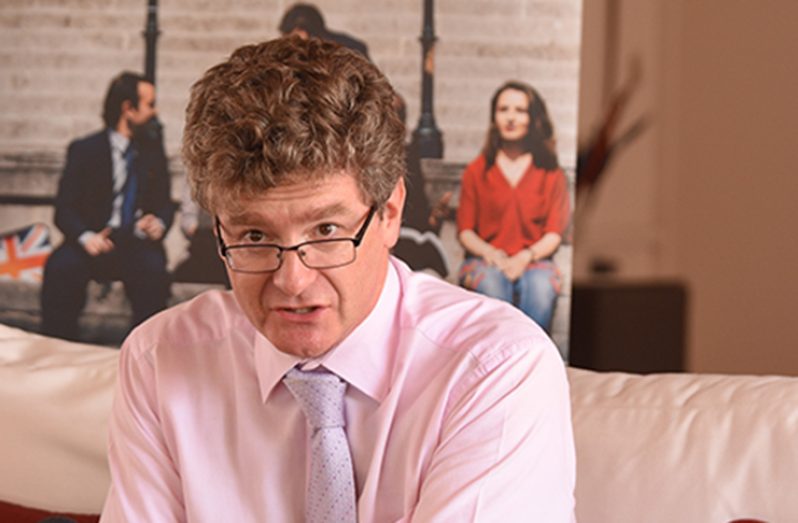…UK envoy highlights training, finance, aviation and maritime
Acknowledging that the project is not an easy one, British High Commissioner to Guyana Greg Quinn says though it may appear that the Security Reform Project is being rolled out at a slow pace, progress is being made in the areas of training, finance, aviation, and maritime.
Quinn made the comments while speaking to reporters at a news conference on Friday. “It has not been an easy project, and we all know it wasn’t going to be easy and if you go back to the original plans in 2007, there was a very clear examination of what the problems were. I think we are moving things forward, maybe a bit slowly than some people would want, but in a way that is deliberate, because we need to make sure that what’s being done, is being done properly,” Quinn said.
Effective implementation of the project is critical to ensuring that the bar of the Guyana Police Force (GPF) is raised, and police officers and ranks are adequately accommodated, trained and equipped.
“We are looking at training now, because fundamentally, how you train your ranks from the beginning, gives you the whole basis of their time in the police force, and I think there is work that can be done there which could have very obvious effects on the ranks,” he noted.
The diplomat also underscored the need for improvements in the area of infrastructure.
“I think there is an understanding that the police infrastructure is not always as good as it should be, and some of the conditions that ranks are living in are really not what they should be and you know you have to treat the ranks and officers properly; and I think that can be done very quickly and very easily,” he added. High Commissioner Quinn also made a case for more females to join the force.
Nonetheless, he maintained that progress is being made under the project.
“I accept that there hasn’t been sort of a big bang, and type approach, a big bang here is the change, but it is a slow and deliberate process, and it is always going to be a slow and deliberate process. But progress is being made, and based on what I am seeing, benefits are starting to come through,” the British High Commissioner assured.
Meanwhile, report which was presented to President David Granger in January by the United Kingdom’s Security Reform Programme Senior Adviser, Colonel Russell Combe is still being deliberated at Cabinet. Quinn said as soon as Cabinet is through with the report it should be made public in the interest of transparency. “We would like to hope that it will be released as soon as possible after Cabinet has discussed it. Transparency in this process is key for us and for everyone, and the more information we can get to the general public to see what the issues are and what needs to be done, I think is good,” the British High Commissioner said. Under the SSRP, a number of activities are being funded by the UK government with guidance from Colonel Combe, the most recent being a review of Guyana Police Force (GPF) training.
The earliest attempts at initiating reforms started back in 1999, when British Regional Adviser, Paul Matthias, visited Guyana to discuss security assistance from Britain. This was followed by the Symonds Report, and the establishment of the National Security Strategy Organising Committee in 2000.
In 2002, the Border and National Security Committee, the National Consultation on Crime, and the National Steering Committee on Crime were established. It will be recalled that in subsequent years, legislation was passed, more crime-fighting bodies were established, and the initial version of the SSRP was signed, but was later scrapped by the former People’s Progressive Party (PPP) government.
Since taking office in May 2015, President Granger has indicated that it is his administration’s intention to have the SSRP re-introduced.
The programme, which was begun in 2007 and cost US$4.7m, was scrapped in 2009 after the British Government requested to have oversight of the programme to ensure that there was ‘value for money’. The former PPP administration disagreed with the manner in which the British Government wanted the programme to be run, and stated that the British had sought to intrude upon Guyana’s sovereignty.
But in its defence, the British Government said the Government of Guyana had submitted a different proposal which had focused on police modernisation rather than a holistic approach to reform, as was originally requested. The British’s intention was to build a workable basis for improving national security, while reducing crime in Guyana by 2011.
With the implementation of the SSRP, the President believes that Guyana’s security sector will be significantly strengthened. He said that Guyana’s vast and porous borders have allowed a number of illicit activities to take place, but that once the SSRP is implemented, the country’s security will be significantly strengthened, thereby allowing for enhanced crime-fighting capabilities and a safe and secure country.




.png)









